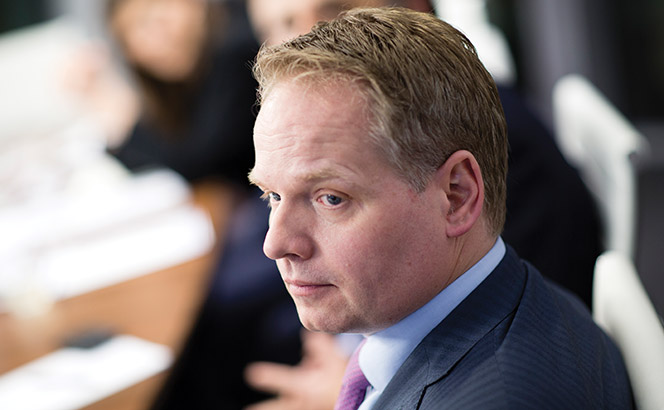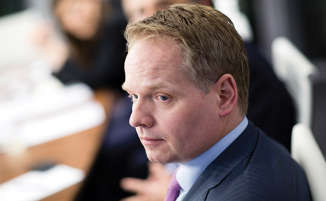DWF chief executive Andrew Leaitherland (pictured) says the £20m cost of its London Stock Exchange listing is ‘money well spent’ after the firm reported double-digit revenue growth and set out its ambitions for further expansion.
The firm said today [31 July] its revenue rose 15% to £272m in the 2018/19 financial year, of which 12.5% was attributable to organic growth. Earnings before interest, tax, depreciation and amortisation rose 9% to £33.6m, but profit after tax fell 42% to £12.2m, impacted by the cost of March’s IPO.
The international and Connected Services businesses provided the thrust, up from relatively small bases by 79% and 23% respectively, for revenue of £54m and £18.5m. The firm grew from 26 international partners in 2017 to 96 in 2018, expanding heavily in Australia where it now has 28 principal lawyers (partner equivalents) and 150 staff.
Following this financial period, the firm also made a £3m law firm acquisition in Poland, with its sights now set on further markets including the USA, Canada, Hong Kong, Spain and the Netherlands.
Leaitherland told an analysts’ call the IPO process – which took more than a year – had been one of the longest years of his life because he had been restricted from M&A activity over that time. The shackles were now off, however, telling Legal Business he would be focusing on acquisition opportunities predominantly internationally and for the Connected Services business, with some possible deals in the UK.
The firm has paid down £19m of debt during the financial year to sit at £35.3m, with Leaitherland saying the firm had about £55m of headroom in its core facilities it could deploy for acquisitions.
‘We obviously kept conversations progressing and alive during the IPO but looking back, you cannot underestimate just how much time was consumed in terms of getting through that process,’ he told Legal Business. ‘We can just get cracking. I’ll be very focused in terms of M&A opportunities and capitalising on the pipeline that we’ve already got.’
That time-consuming process was also revealed today to have cost about £20m, of which £12.6m impacted the firm’s profit with the remainder funded by reserves. Leaitherland said a lot of that cost was attributable to regulatory advice it obtained engaging with regulators in different jurisdictions on how the listed law firm structure can operate in other countries.
‘I don’t think I’ve ever done a transaction where [the cost has] come in as I expected it to be, an IPO has unexpected twists and turns and unexpected complications,’ he told Legal Business. ‘We listed on the main market of the London Stock Exchange, that’s not a cheap process.’
But he added: ‘The regulatory advice has future-proofed the structure, it’s money well spent. We’ve got a pretty good idea of what we can do where and how.’
Leaitherland also highlighted the opportunity he sees for DWF’s Managed Services business. Earlier this month this division landed the firm its first major post-IPO client win after securing a five-year managed legal services mandate for BT’s insurance and real estate work, seeing up to 40 lawyers from BT’s in-house legal team transfer to DWF by the end of this year.
DWF was chosen ahead of 25 other providers, with Leaitherland saying he was restricted from commenting on the value of the deal but suggesting it had moved DWF from being a top ten provider of legal services to BT, to a top three. Managed services is now led by former RBS head of artificial intelligence for the bank’s commercial and private banking business, Mark St John Qualter, after Anup Kollanethu left the firm after less than a year in June.
‘There’s more to do, we have a really strong pipeline in terms of potential contracts in that space,’ Leaitherland said. ‘[The BT deal has] definitely stimulated interest and given confidence to people that that’s how things can be done.’















